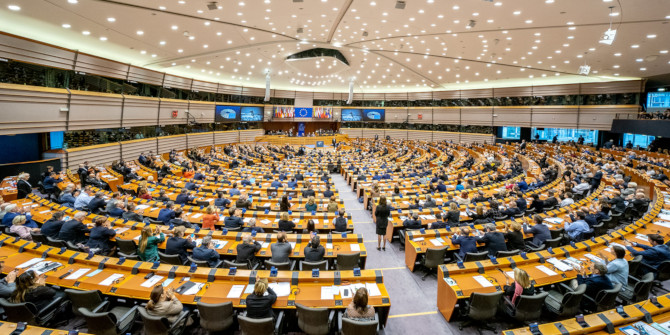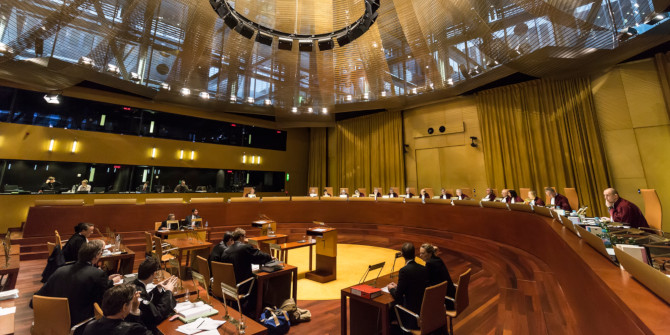Previous research has found that people often have similar political preferences to their parents. Drawing on new research, Stuart J. Turnbull-Dugarte illustrates that while this may be true overall, lesbian, gay and bisexual (LGB) individuals from Conservative-voting homes are significantly more likely to form political attachments independently from their parents.
“The apple never falls far from the tree” is an age-old English proverb that signals the intergenerational nature of important characteristics between parent and child. The proverb often applies to the increasingly tribal nature of politics. Voters, on average, tend to have the ideological preferences that are close to those held by their parents and the same is true of voting behaviour: if your parents voted Conservative, the odds are that, on average, you are more likely to do so too.
The hereditary nature of political dispositions is often viewed as a function of two processes that are not mutually exclusive. On the one hand, partisanship and political views may be hard wired into children by direct and explicit action from parents. This path, so the theory goes, assumes that partisan loyalties and political preferences are sufficiently important that parents consciously bring their children up to emulate these attachments.
A second, and less direct, mechanism takes place via the shared socio-economic position and socio-cultural identities that children share with their parents. Via this path, Conservative-voting households produce Conservative-voting children not because loyalty to the Conservative Party is taught at home but because the structurally equivalent paths that made parents Conservatives are also likely to apply to the children. In other words, sharing the same socio-economic and socio-cultural identities as our parents and the local communities that we belong to makes us behave and believe (politically) in a similar way to them.
This parent-child political transmission assumes, however, that salient social identities are also shared between generations. In most cases this is true: black parents give birth to black children, the children of working-class parents are born into working-class homes, practising Catholics tend to baptise their children. But not all identities are intergenerational: heterosexual and cisgender parents produce children that identify as lesbian, gay, bisexual, non-binary, transgender, queer and other gender non-confirming identities (LGBTQ+).
Figure 1: LGBTQ+ identity as a (non-hereditary) social identity
 Note: For more information, see the author’s accompanying (open access) paper in the Journal of European Public Policy
Note: For more information, see the author’s accompanying (open access) paper in the Journal of European Public Policy
Being LGBTQ+, as demonstrated in previous research, leads to the development of distinctive political preferences and LGBTQ+ citizens are more inclined, regardless of their economic status, to place a premium on policy preferences like economic redistribution and more liberal immigration policies vis-à-vis heterosexuals. Does the acquisition of these non-hereditary social identities that involve their own out-group socialisation processes disrupt the intergenerational transmission of political dispositions and electoral choices?
In a recent study, I sought to assess this. I did so by asking: do queer voters, who harbour important social identities acquired outside of the home, deviate politically from their parents? Using the excellent data from the British Election Study, I tested whether LGB voters shared the same party preferences as their parents and whether the probability of doing so was similar to that observed among heterosexuals from the same partisan households.
Figure 2: Dispersion of voting preferences based on parental partisanship and sexuality
 Note: For more information, see the author’s accompanying (open access) paper in the Journal of European Public Policy
Note: For more information, see the author’s accompanying (open access) paper in the Journal of European Public Policy
The primary results are summarised visually in Figure 2. Looking first at those individuals whose parents voted for Labour, the results show that just over half (52%) of heterosexuals from Labour-voting homes cast their votes for socially liberal parties: Labour, Liberal Democrats and the Greens. This proportion is significantly smaller than that observed among LGB voters: 70% of LGB-identifying individuals from Labour-voting homes cast their votes for the same socially liberal parties. Focusing on Labour-voting parents then, the results suggest that LGBs are more (not less) likely to inherit the partisan attachments of their parents and that, if anything, it is heterosexual voters that are more inclined to break away from the partisan loyalties of their parents.
These dynamics are dramatically reversed when we consider those from Conservative-voting homes. Among heterosexuals, two in three (66%) voters with Conservative-voting parents will cast a ballot for the Tories. This proportion of hereditary partisanship among heterosexuals is notably higher than that seen among those with Labour-voting parents, consistent with evidence of more volatility among those on the left. LGBs who come from these Conservative homes are thirty-two percent less likely to vote for the same party as their parents. This divergence can be explained, in part, by the fact that LGB voters express feeling politically more distant from the party of their parents when their parents voted for the Conservatives (see Figure 3).
Figure 3: LGBs feel further away from the politics of their (Conservative-voting) parents Note: For more information, see the author’s accompanying (open access) paper in the Journal of European Public Policy
Note: For more information, see the author’s accompanying (open access) paper in the Journal of European Public Policy
In several additional tests in the study, I also demonstrate that the sexual gap in hereditary partisanship, while present for both men and women, is four times greater for lesbian and bisexual women than it is for gay and bisexual men. Whereas, on average, the probability of voting for the same party as their parents is twelve percentage-points lower for gay/bisexual men, the divergence between heterosexual and non-heterosexual women is forty-one percentage points.
In terms of our understanding of political sociology, these findings challenge traditional notions of intergenerational political transmission, highlighting the political agency of LGBTQ+ identity acquisition and the disruptive role of LGBTQ+ identities on the transmission of political values within the household. By breaking away from the (Conservative) political norms within their families, LGBTQ+ individuals contribute to a diversification of political preferences among emerging cohorts that leans towards the left.
LGBTQ+ individuals, whilst a minority in comparison to cisgender heterosexuals, are not numerically marginal: among younger cohorts of the population, self-identifying LGBTQ+ individuals make up 20% of the population. LGBTQ+ individuals are not only politically distinct from their heterosexual peers but are also significantly different from their parents, particularly those who sympathise with the political right. The consequences of this intergenerational deviation, therefore, suggest that a non-trivial proportion of Conservative-voting homes may not provide the organic generational voter replacement that the UK’s main right-wing party may hope for.
For more information, see the author’s accompanying (open access) paper in the Journal of European Public Policy
Note: This article gives the views of the authors, not the position of EUROPP – European Politics and Policy or the London School of Economics. Featured image credit: Khakimullin Aleksandr / Shutterstock.com





